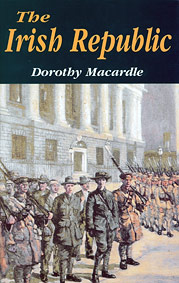
Her
detailed chronicle covers the seven years between the Easter Rising of 1916 and
the end of the Civil War. Introductory chapters review earlier phases of the
Irish resistance to conquest, the efforts to secure Home Rule and the beginning
of Sinn Fein. After May 1923, the story is carried forward, as a brief survey,
to the further implementation of the Treaty by the signing of the Partition
Agreement in London in December 1925.
First
published in 1937, The Irish Republic
has long held a place of honour in
many Irish households. It is an account of the struggle from the viewpoint of
one who was active throughout the turbulent years of the inception of the
fledgling state. This major work has been reissued for the benefit of a whole
generation who have not had the opportunity to own it.
Dorothy
Macardle was born in Dundalk, Co. Louth. After graduating from UCD she taught
at Alexandra College, Dundalk, until she was taken into custody for Republican
activities. She was an active Republican throughout the turbulent years between
1916 and 1923 and later became the representative of the
Irish Press at
the League of Nations, the precursor of the UN. Ten years in the writing,
The
Irish Republic is her major work. Dorothy Macardle died in 1959.
'The
Irish Republic
is the only book that I know of
which gives a
connected
authoritative account of the period 1916 to 1923, and
no
one who wishes to understand this period of Irish history,
or
whose work brings them to deal with it in any detail,
should
be without a copy'
Eamon
de Valera
This
exposition, or narrative, of events in Ireland during the seven
momentous
years from 1616 to 1923 may be regarded as an
outstanding
contribution to the materials of history, and it is
certain
to remain for many years the best standard reference
for
that period....We know of no better description of events
of
1917 than is to be found in this volume.'
The
Irish Times
...
the first account that can sincerely be called "complete and
authoritative"....
It has not only the qualities of accuracy, wealth
of
detail, a trained perspective and that intimacy with events
upon
which the President commented. It has also a style and
a
sense of dramatic values which makes its reading as moving
and
enthralling as the watching of a great play greatly acted.
This
reviewer knows of no other similar work in which the
smoothness
of the narrative so completely survives the
necessarily
multitudinous incidents preserved in the chronicle.'
Irish
Press
WOLFHOUND PRESS,
68,
ISBN
0-86327-712-8